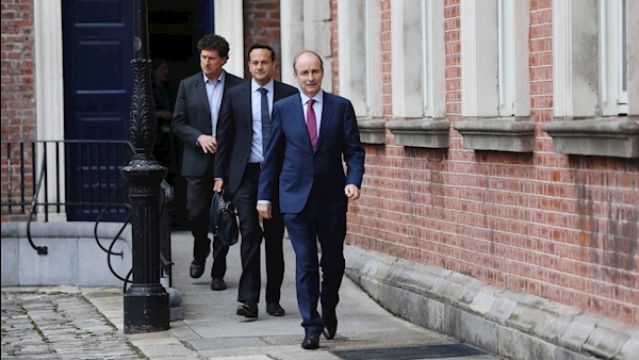Fines for people who leave their county for non-essential reasons are being considered by the Government, according to the Taoiseach.
Micheál Martin said a group of high level officials met this morning and the issue is under consideration: "The oversight group met this morning, we’re looking at the whole area of fines for example in terms of traffic and so on like that.”
It comes amid reports that Tánaiste Leo Varadkar proposed a system of graduated fines - which could include €50 penalties for not wearing face masks and €200 penalties for leaving your county - to his party last night according to the Irish Times.
Sources present at the Fine Gael parliamentary party meeting said Mr Varadkar told TDs and Senators that the previous system of €2,500 fines for those who break Covid-19 regulations was seen as draconian, and that a system of graduated fines should be considered instead.
However, earlier today a Government spokesperson said the Government has no immediate plan for a new system of fines for breaching public health guidelines though "all options are under review."
The spokesperson added that fines are already in place for breaches of public health regulations such as organising a public gathering: “The law already provides for fines of €2,500 for breach of some laws like organising a gathering or not wearing a mask on public transport."
Garda powers
It comes as gardaí have recommenced Operation Fanacht to support compliance with new Level 3 restrictions around the country to curb the spread of Covid-19.
Some of the restrictions in the Government’s Living with Covid-19 plan carry fines or prison sentences while others rely on the public's willingness to adhere to the measures.
Gardaí do not currently have enforcement powers to ensure people do not travel outside their county aside from essential purposes, however, new powers will be requested if compliance becomes a problem.
Former Assistant Commissioner Pat Leahy has said it should not be solely down to gardaí to control the spread of the virus.
“I don’t think that it’s something that should be left to the guards alone anyway, I think if you look at the Resilience and Recovery plan, it talks about rapid and targeted outbreak management,” he said.
“It also talks about the mid-emergency management framework to be implemented in phases 3 to 5, which really is about a collaborative approach to this, a coordinated collaborative approach by the principal response agencies, the Garda Síochána being one.”







